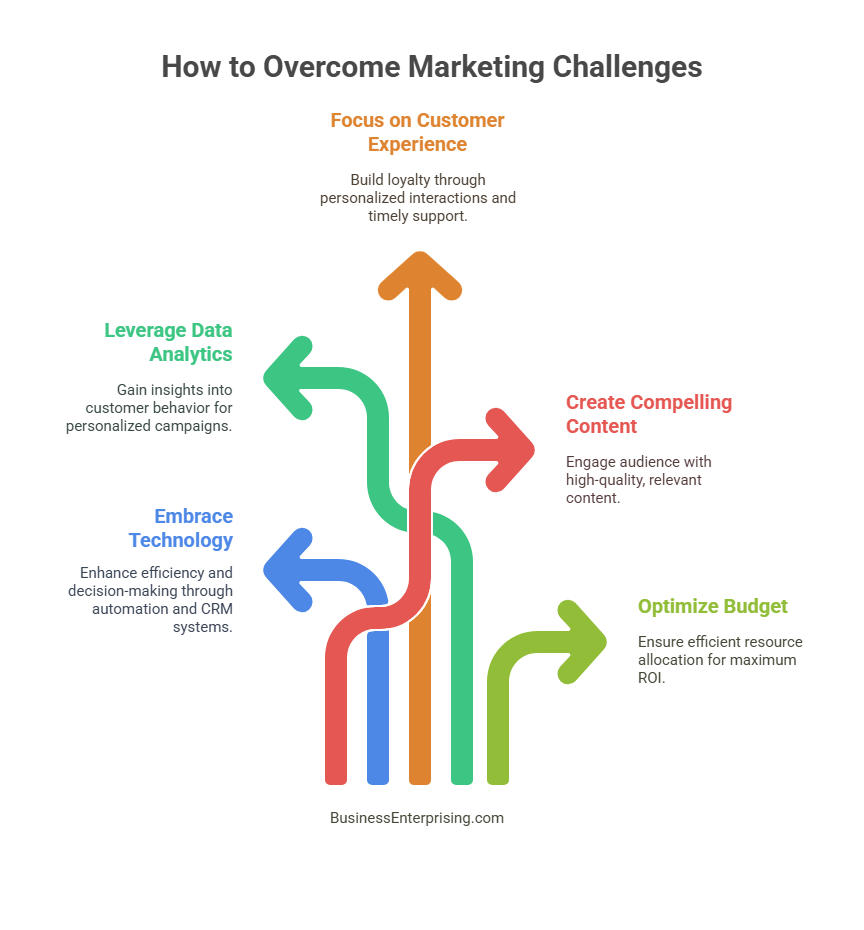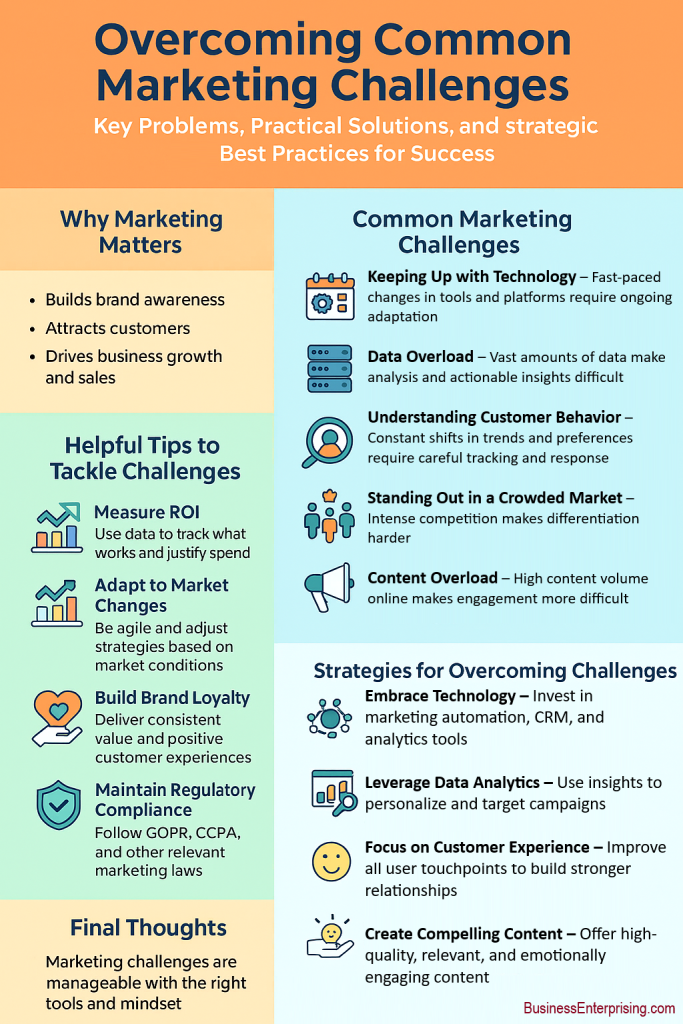 Marketing is an essential function for any business, playing a critical role in building brand awareness, attracting customers, and driving sales. However, in today’s dynamic and competitive environment, businesses face a myriad of marketing challenges. From keeping up with technological advancements to standing out in a crowded marketplace, these challenges can be daunting.
Marketing is an essential function for any business, playing a critical role in building brand awareness, attracting customers, and driving sales. However, in today’s dynamic and competitive environment, businesses face a myriad of marketing challenges. From keeping up with technological advancements to standing out in a crowded marketplace, these challenges can be daunting.
Common Challenges with Marketing
Keeping Up with Technology: The rapid pace of technological change often challenges businesses to stay updated with modern marketing tools and platforms. As a result, emerging technologies such as artificial intelligence, machine learning, and advanced data analytics require companies to continually adapt. Therefore, maintaining relevance means embracing innovation and adjusting strategies frequently.
Data Overload: Furthermore, the rise of digital platforms has given businesses access to vast amounts of data. However, managing and analyzing this data to gain useful insights can feel overwhelming. Consequently, finding the right tools and skilled personnel to handle this data effectively becomes a significant hurdle for many organizations.
Understanding Customer Behavior: Additionally, consumer behavior continues to shift, shaped by trends, cultural influences, and evolving technology. Therefore, staying in tune with these changes is critical. Businesses must also understand what motivates customer decisions in order to develop effective and timely marketing strategies.
Standing Out in a Crowded Market: Meanwhile, competition grows fiercer by the day, with numerous brands fighting for the same audience’s attention. As a result, businesses must work harder to differentiate themselves. Therefore, creating a distinct value proposition is essential for capturing interest and building loyalty.
Content Overload: Moreover, the internet is saturated with content, making it difficult to stand out. Simply creating more isn’t enough. Instead, businesses must focus on producing high-quality, relevant, and engaging content. This, however, requires time, creativity, and a well-thought-out strategy.
Budget Constraints: Lastly, limited budgets remain a major obstacle, especially for small and mid-sized businesses. Consequently, efficient resource allocation becomes a top priority. Therefore, maximizing return on investment requires careful planning, strategic execution, and ongoing performance analysis.
Helpful Tips
Measuring ROI: Demonstrating the ROI of marketing efforts can be challenging. Identifying which strategies and channels are most effective and justifying marketing spend to stakeholders requires robust tracking and analysis.
Adapting to Market Changes: Market conditions can change rapidly due to economic shifts, regulatory changes, or competitive dynamics. Businesses must be agile and responsive to adapt their marketing strategies accordingly.
Building and Maintaining Brand Loyalty: With customers having more choices than ever, building and maintaining brand loyalty is a significant challenge. Consistently delivering value and positive experiences is key to retaining customers.
Regulatory Compliance: Navigating the complex landscape of marketing regulations, such as data privacy laws (e.g., GDPR, CCPA), can be challenging. Ensuring compliance while implementing effective marketing strategies requires careful planning and execution.
Strategies for Overcoming Challenges with Marketing
To address these challenges and achieve marketing success, businesses should consider the following strategies:
Embrace Technological Advancements: Stay informed about the latest marketing technologies and trends. Invest in tools that enhance marketing efficiency, such as marketing automation platforms, customer relationship management (CRM) systems, and data analytics software. Leveraging technology can help streamline processes and improve decision-making.
Leverage Data Analytics: Use data analytics to gain insights into customer behavior, preferences, and trends. Invest in tools and expertise to collect, analyze, and interpret data effectively. Data-driven marketing enables personalized and targeted campaigns that resonate with your audience.
Focus on Customer Experience: Prioritize delivering exceptional customer experiences across all touchpoints. Understand your customers’ journey and identify opportunities to enhance their experience. Personalized interactions, timely support, and value-added services can differentiate your brand and build loyalty.
Create Compelling Content: Develop high-quality, relevant, and engaging content that addresses your audience’s needs and interests. Use storytelling to connect emotionally with your audience. Implement a content strategy that includes a mix of formats (blogs, videos, infographics) and channels (social media, email, websites).
Optimize Budget Allocation: Conduct a thorough analysis of your marketing spend and identify areas with the highest ROI. Allocate resources to the most effective channels and strategies. Use A/B testing to optimize campaigns and ensure efficient use of the marketing budget.
Best Practices
Measure and Adapt: Implement robust tracking and measurement systems to evaluate the performance of your marketing efforts. Use key performance indicators (KPIs) to monitor progress and identify areas for improvement. Be prepared to pivot and adapt your strategies based on data insights and market changes.
Build a Strong Brand Identity: Invest in building a strong, consistent brand identity that resonates with your target audience. Develop a unique value proposition and communicate it effectively through your marketing efforts. Consistency in messaging and visual elements helps build brand recognition and trust.
Foster Customer Loyalty: Implement loyalty programs and engage with customers regularly to build lasting relationships. Show appreciation for their business through personalized offers, exclusive discounts, and exceptional service. Loyal customers are more likely to advocate for your brand and refer others.
Stay Compliant with Regulations: Ensure that your marketing practices comply with relevant regulations. Stay informed about changes in laws and regulations that affect your industry. Implement data privacy measures and obtain necessary consents to build trust and avoid legal issues.
Invest in Professional Development: Continuous learning is essential for staying ahead in the marketing field. Encourage your marketing team to attend workshops, conferences, and training programs. Staying updated with industry trends and best practices enhances your team’s skills and effectiveness.
Summation
Marketing challenges are an inevitable part of running a business, but they can be effectively managed with the right strategies and mindset. By embracing technology, leveraging data analytics, focusing on customer experience, creating compelling content, optimizing budget allocation, and measuring performance, businesses can navigate the complexities of the marketing landscape.
Building a strong brand identity, fostering customer loyalty, ensuring regulatory compliance, and investing in professional development further contribute to marketing success. In today’s fast-paced and competitive market, staying agile and responsive to changes is crucial. By adopting these strategies, businesses can overcome marketing problems and achieve sustained growth and success.


